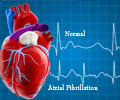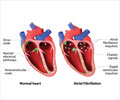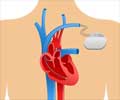Untreated atrial fibrillation increases the risk of heart-related death and is linked to a five times increased risk of stroke.

"It's crucial to better understand modifiable risk factors of atrial fibrillation," said study author Christina Magnussen, M.D., a medical specialist in Internal Medicine and Cardiology at the University Heart Center in Hamburg, Germany.
"If prevention strategies succeed in targeting these risk factors, we expect a noticeable decline in new-onset atrial fibrillation."
Researchers reviewed records of 79,793 people (aged 24 to 97) in four community-based studies in Europe. The participants did not have atrial fibrillation at the outset. Later assessments of their health with a median follow-up period of 12.6 to a maximum of 28.2 years showed that 4.4 percent of the women and 6.4 percent of the men had been diagnosed with the condition.
Researchers noted atrial fibrillation:
- diagnosis rates jumped when men were 50 or older and women were 60 or older;
- developed in about 24 percent of both men and women by age 90;
- onset was tied to higher blood levels of C-reactive protein (inflammation marker) in men;
- new atrial fibrillation cases increased more in men than women with increases in body mass index (BMI): 31 percent in men and 18 percent in women.
Researchers were surprised to find that higher total cholesterol, a risk factor for heart disease, lowered risk for developing atrial fibrillation, especially in women, although exactly why is not clear.
Advertisement
Strengths of the research include that it studied the condition in the general population and noted how individuals fared over long periods.
Advertisement
Atrial Fibrillation
According to American Heart Association statistics, between 2.7 and 6 million Americans are living with atrial fibrillation, and more than 12 million are expected to have the condition in 2030.
Risk factors include body mass index, systolic blood pressure, total cholesterol, diabetes, smoking, alcohol consumption, previous heart attack or stroke and presence of heart disease.
Source-Eurekalert














